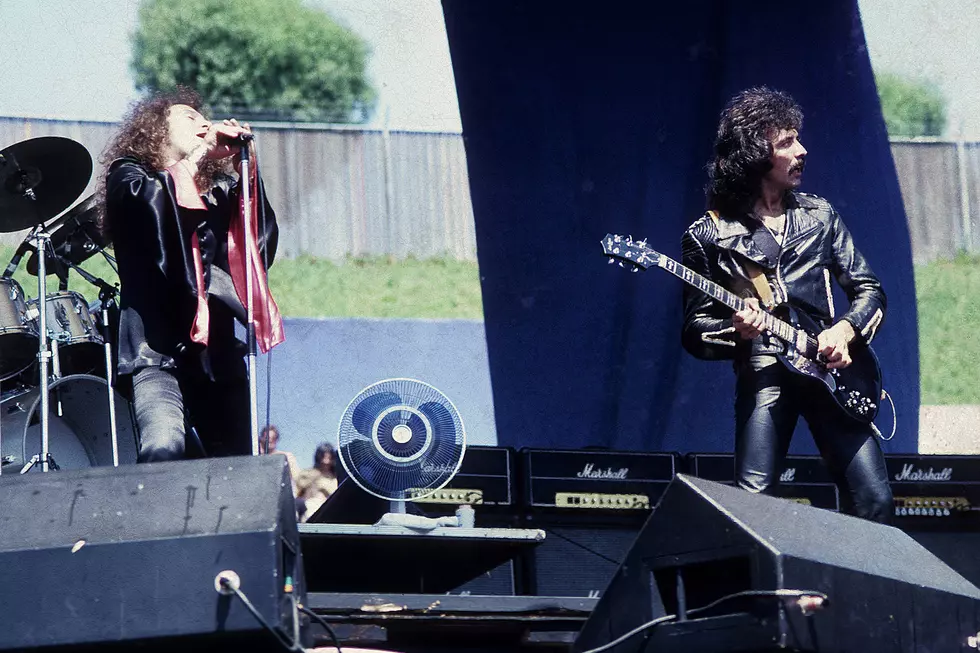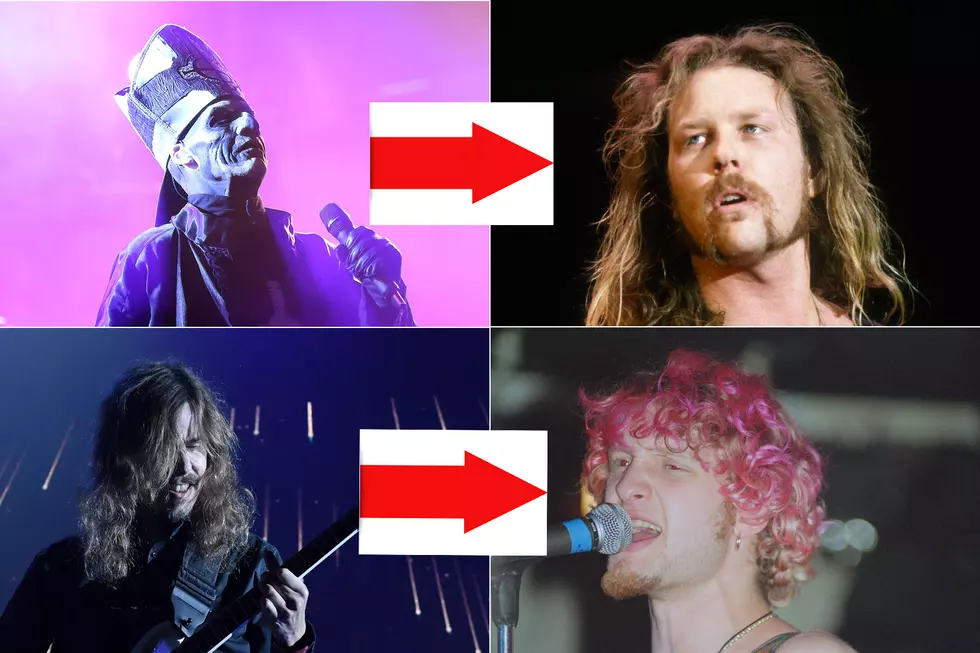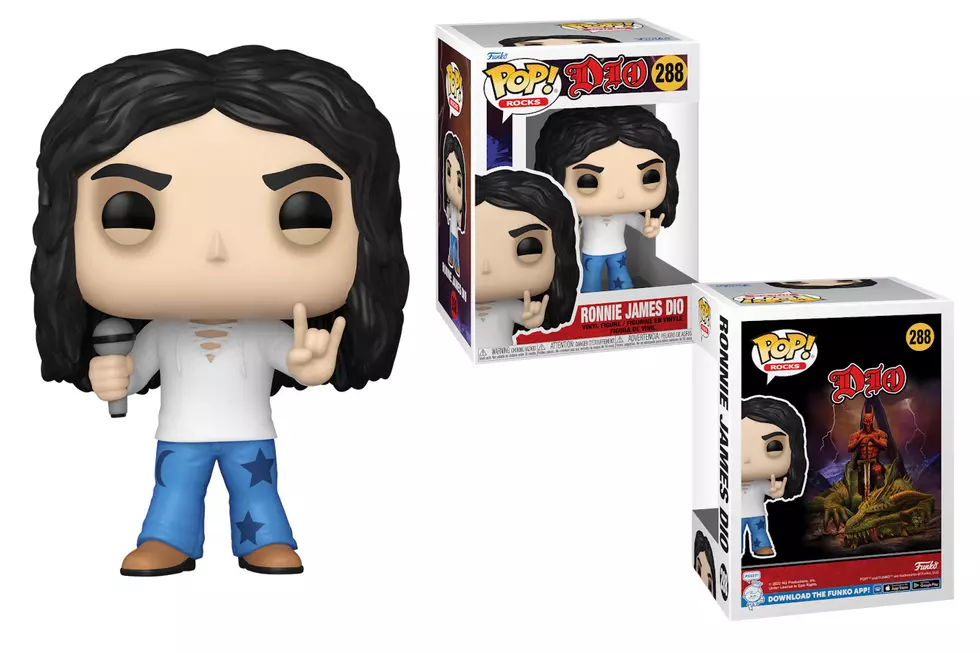
When Ronnie James Dio Played His Original Last Black Sabbath Show
Ronnie James Dio steered Black Sabbath away from the brink of self-destruction when he replaced the ousted Ozzy Osbourne in 1979. But just three years and two beloved albums later, he'd sing his (first) last note with Black Sabbath on Aug. 31, 1982, at the Poplar Creek Music Theater in Hoffman Estates, Ill.
Black Sabbath was on life support by the end of the '70s after their last two albums, 1976's Technical Ecstasy and 1978's Never Say Die!, flatlined critically and commercially. Not that guitarist Tony Iommi, bassist Geezer Butler and drummer Bill Ward had much capacity to care, so consumed were they by addiction, depression and other personal issues. With their singer gone and their commercial prospects decimated, Black Sabbath seemed wholly unfit to weather the next decade.
Enter Dio, who was coming off a successful but short-lived and fraught stint in Ritchie Blackmore's Rainbow, which produced a stone-cold metal classic in 1976's Rising. Dio and Iommi met in 1979 at the Rainbow Bar and Grill in Los Angeles, appropriately enough. A jam session quickly followed and birthed the epic "Children of the Sea," which appeared on 1980's Heaven and Hell, the first full-length effort from the revitalized Black Sabbath Mark II.
Suddenly Dio had a new job, and Black Sabbath had a new lease on life. Heaven and Hell was a platinum-selling, career-rejuvenating masterpiece, cracking the Top 30 in the United States and putting the band back in front of arena-sized crowds. Its 1981 successor Mob Rules, which featured a young Vinny Appice behind the kit in place of the recently fired Ward, performed similarly well. But soon, the cracks in Black Sabbath's world-conquering veneer once again began to show.
Listen to Black Sabbath's 'Heaven and Hell'
Friction arose between Iommi and Dio, the band's two creative principals. The guitarist previously delighted in his new bandmate's musical input and consummate workaholism, which stood in stark contrast to Osbourne's drugged-out layabout behavior. But he and Butler grew to resent Dio for what they perceived as his efforts to usurp them as Black Sabbath's de facto leaders. Dio, meanwhile, found himself increasingly alienated from Iommi, who grew more reclusive and disagreeable as his cocaine habit swelled.
The dysfunction reached a boiling point when Black Sabbath began working on 1982's Live Evil, which was culled from several performances on the Mob Rules tour. Iommi and Butler accused Dio of sneaking into the studio at night to remix the LP behind their backs, boosting his vocals and Appice's drums and lowering the guitar and bass — an accusation Appice denied in Mick Wall's band biography Symptom of the Universe.
"What happened was, they booked the studio for 2 o'clock. But [Iommi and Butler] wouldn't get there until 4 or 5 o'clock, and this was an expensive studio," Appice explained. "Me and Ronnie would be there at 2. I had no say in this, I just came in when they wanted me in. But Ronnie wanted to do some work, so he would start doing whatever needed to be done, and they took that as Ronnie sneaking in the studio and doing stuff behind their back."
Eventually, the intra-band cold war became too much to bear. "Something had come to a head and it was the whole avoiding confrontation thing, which Geezer and Tony specialize in," Dio said in Symptom of the Universe. "Eventually Geezer phones me and says, 'I don't think this is working out. We really want Tony to produce the album on his own.' Now I know this kind of cryptic talk, so I say, 'So if you don't want me involved with this album, are you saying it's over then?' And Geezer says, 'Well, er ... yeah, I suppose so.' They could never just tell you straight. It was all a device to force me out."
As a parting shot, Iommi and Butler shortened the singer's name to "Ronnie Dio," which he hated, in the credits to Live Evil. Dio later dismissed the LP as "a piece of shit," but the acrimonious conditions of Live Evil belie the fact that Black Sabbath was firing on all cylinders on the Mob Rules tour.
Audio from the last stop of the tour shows Black Sabbath at the peak of its powers, barreling through a 90-minute set comprising both Osbourne and Dio-era classics, including "Neon Knights," War Pigs," "Heaven and Hell," "Mob Rules," "Paranoid" and the titular "Black Sabbath." Iommi alternates between doom-laden riffs and blistering solos as Dio effortlessly sells the mega-watt intensity of his material and the theatrical, slow-burning horror of the Ozzy tracks. Butler and Appice show their capacity to both pulverize and swing, holding down the fort with muscular grooves and lithe fills.
Hear Ronnie James Dio's First Last Show With Black Sabbath
Sadly, the onstage chemistry wasn't enough for the band members to overcome their offstage differences. Dio quit Black Sabbath in late 1982 with Appice in tow and went on to form an eponymous band whose 1983 debut, Holy Diver, became a career-defining classic and a cornerstone of heavy metal. Black Sabbath, meanwhile, would welcome a revolving group of singers throughout the rest of the decade to diminishing returns.
Dio would return a few more times over the following decades, first on Black Sabbath's 1992 album Dehumanizer and later as the rechristened Heaven and Hell, which formed in 2006. They released The Devil You Know in 2009 and continued until Dio died in 2010.
It was a heartening reconciliation for a band in which Dio always took great pride. He told Wall he was "filled with both optimism for my new band and sadness for what had just happened" upon his first exit from Black Sabbath. "I wasn't happy with the way everything ended, but I could feel proud of what I had achieved. ... I gave as much to Sabbath as Sabbath gave to me, probably more so."
Top 50 Classic Heavy Metal Albums
You Think You Know Black Sabbath?
More From KYBB-FM / B102.7










